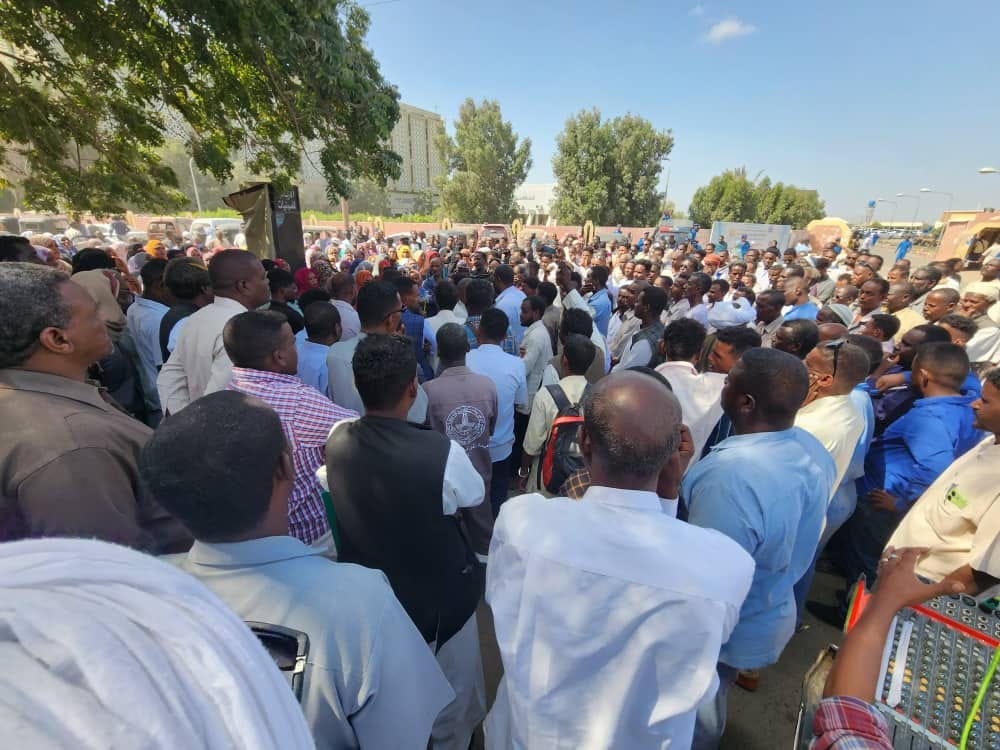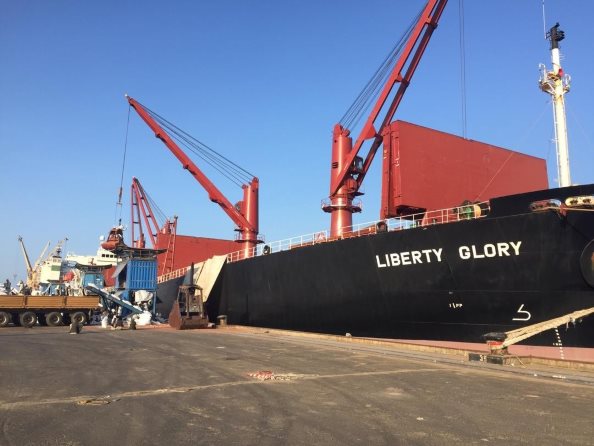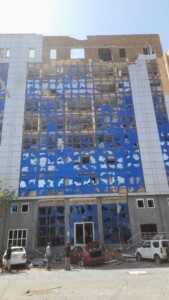Int’l Workers’ Day: ‘Bleak prospects’ for workers in war-torn Sudan

Employees of Sudan’s Sea Ports Corporation attend a protest against decisions by the Ministry of Finance (File photo: Supplied)
As workers, labour organisations, and trade unions around the world marked International Workers Day on May 1, workers across Sudan face bleak prospects as the war between the Sudanese Armed Forces (SAF) and paramilitary Rapid Support Forces (RSF) rages into its second year. The destruction wreaked by the war has impacted all aspects of life, and the lives of workers in particular. They find themselves without hope, work, or shelter.
The country’s industrial infrastructure, especially around the capital Khartoum, has been systematically destroyed, workers have been displaced. The harbour of Port Sudan – currently the de facto capital – is one of the only places where workers continue to assert their rights, as they facilitate the import and export of goods, crucial to Sudan’s economy*.

Radio Dabanga reporter Suleiman Siri spoke to several Sudanese labour and trade union commentators, who praise Sudan’s workers for their resilience, and encourage unity among trade unions, asserting that the collective action of unified trade union workers could contribute to ending the war, achieve peace, and promote the goals of the December 2018 Revolution.
The war conditions in Sudan did not prevent the workers of the seaports in Port Sudan from exercising their rights and freedom of association to organise themselves, demonstrate, peaceful protest, and to obtain their rights. Experts consider this a victory for the union movement. However, they also lament the influence of “capitalist opportunism” that is facilitated by the ‘fog of war’.
‘Corporate greed’
Trade union expert, head of the Engineers Syndicate, and former director of the Sudan Railways, Hashim Ahmed, salutes the struggle of the Sudanese workers and their victories in achieving their demands, “for standing up in the face of the greed of capitalists by exploiting the institutions and the country’s capabilities”.
Ahmed points out to Radio Dabanga that this year on Workers’ Day, the Sudanese people, and workers in particular are suffering from the disasters of internal war. He accuses countries and international organisations, along with what he called their “internal agents”, of igniting and perpetuating the war. “The war’s devastating effects have plunged Sudan into new waves of killing, terrorism, displacement, liquidation, and the plunder of their property and capabilities,” he says.
‘Most Sudanese workers have not been paid for many months…’ – Hashim Ahmed
The greatest burden
“Today, Sudan’s workers bear the greatest burden of suffering due to the ambitions and attempts of capitalism to seize institutions and their managements and introduce investment projects for their own benefit,” says Ahmed, “with their plans to privatise ports, energy, agriculture, and industrial projects.” All these steps would expose workers to displacement and dismissal. They were already suffering from hardship and lack of wages. “Most of the workers have not been paid their salaries for many months.”
‘There are parties trying to fan the flames of tribal conflict and antagonise armed tribes against each other to block the way to any attempts at peace…’ – Hashim Ahmed
He accuses unnamed parties of “working to fragment the unity of the trade union movement and preoccupying it with these problems… They are also trying to fan the flames of tribal conflict and antagonise armed tribes against each other to block the way to any attempts at peace. We have to stand up and confront strongly against this, in order to prevent it developing into a civil war.”
Ahmed called on all unions, organisations, activists, and the Sudanese people “to unite, join hands and resolve to defeat this plan, demand that the war be stopped and ended, and for May 1 to become a landmark in the struggle of the Sudanese people and the trade union movement in achieving the goals of its revolution for change”.
Systematic destruction
Researcher and trade union expert Dr Siddig El Zailai told Radio Dabanga that “Sudan on May 1 2024 is reeling under war crimes and the systematic destruction of all aspects of life, especially the lives of workers. Most of the basic industries located in and around the de jure capital of Khartoum have been destroyed, and their staff displaced.”
He points out that factories, offices, and sites located outside of the capital are in no better condition than those that were destroyed in Khartoum. “They cannot operate because of the military reality, the continuous clashes, and shells falling of production facilities,” he says.
“Industries in El Gezira have also been destroyed, and the railways are operating far below its capacity,” he laments.
‘Port workers are the sector still working in response to the country’s need for the movement of export and import of goods…’ – Dr Siddig El Zailai
“Port workers are the sector still working in response to the country’s need for the movement of export and import of goods.” El Zailai lauded the positions taken by the port workers, pointing out that “they have a history of struggle and a long legacy, in the face of all privatisation attempts [most recently in March this year – RD] that have continued for years. They also resisted selling the port or establishing new ports in Abu Amama. They are now demanding and fighting to modernise the current port to use its maximum capacity for the benefit of the Sudanese people and within the framework of the Sea Ports Corporation.”
‘There is no alternative to stopping and ending the war so that the wheel of production returns…’ – Dr Siddiq El Zailai
El Zailai praised the trade unions of journalists, doctors, dramatists, and all groups that began to organise themselves in democratic forms, with which the trade union movement was known. “There is no alternative to stopping and ending the war and addressing its roots, so that the wheel of production returns and productive life returns, so that workers and all professionals can return to their positions in the front lines of the struggle for stability in a democratic, multi-ethnic Sudan, not subject to military rule.”
‘Trade union vacuum’
Trade union expert Mahjoub Kanari expresses his solidarity with the workers of Sudan, who he says, “are living in war conditions in addition to the economic hardship that has imposed a stranglehold on them, in light of the lack of attention of successive governments”.
‘Sudanese workers are living in a trade union vacuum that has lasted for 35 years, during which workers were deprived of the right to organise…’ – Mahjoub Kanari
Kanari points out that “even those few who remain in their places of work suffer from insecurity and living conditions in a state of war, without salaries or leave, wholesale displacement, and laws that do not contain any reference to dealing with disasters and crises. They are living in a trade union vacuum that has lasted for 35 years, during which workers were deprived of the right to organise”.
The labour movement in Sudan was the pioneer of trade union organisation in Africa and the Middle East, he asserts. It had a role in independence and in the Sudanese national movement in all its aspects, and in opposing the dictatorships of Ibrahim Abboud, Jaafar Nimeiry and Omar Al Bashir.
“We must work to correct our mistakes, and remove every obstacle that stands in the way of the right to organise and what it means in terms of legitimate rights to a decent life.”
Irregular workers
Fagiri Abadi, former secretary-general of the General Union of Sea Ports Corporation Employees, considers that workers are living in unnatural conditions, “especially because of the significant decline in the freedoms of union work and freedom of movement of workers since the outbreak of the current conflict in April 2023”.
Abadi: “Sudanese workers have suffered from injustice as a result of Sudanese legislation and laws throughout history, which ignored workers’ rights, with practical laws such as the Labour Relations Law in the Private Sector being unsound laws, which undermined workers’ rights for the benefit of employers”.
He noted that particularly, the deposed Al Bashir regime passed laws that curtained freedom of association and movement by relying on the system of established unions at the expense of trade unions. “The regime worked to directly influence workers’ rights, even at the sector and private levels.”
* Trade unions in Sudan, officially established in 1947, have always been well organised. They were instrumental in the October 1964 Revolution, which overthrew Ibrahim Abboud’s dictatorship, and the popular uprising against President Jaafar El Nimeiri in March 1985 when the people chose their leadership represented by the Union Association. For this reason, the regime of Al Bashir dissolved the trade unions and other professional associations a year after it took power in a military coup in June 1989 and established new unions with members affiliated with the new regime.
When the Al Bashir regime was overthrown and a transitional government was installed after a popular revolution, the civilian government of PM Abdallah Hamdok, which shared power with the military, dissolved the unions affiliated with the former regime as part of legal reforms to dismantle the former dictatorial regime. After the subsequent coup d’état of October 25 against Hamdok, in which the military seized power once again, the authorities began reinstate many of the Al Bashir-era unions, similar to what they did after taking power in the 2019 coup.
#IntWorkersDay











 and then
and then